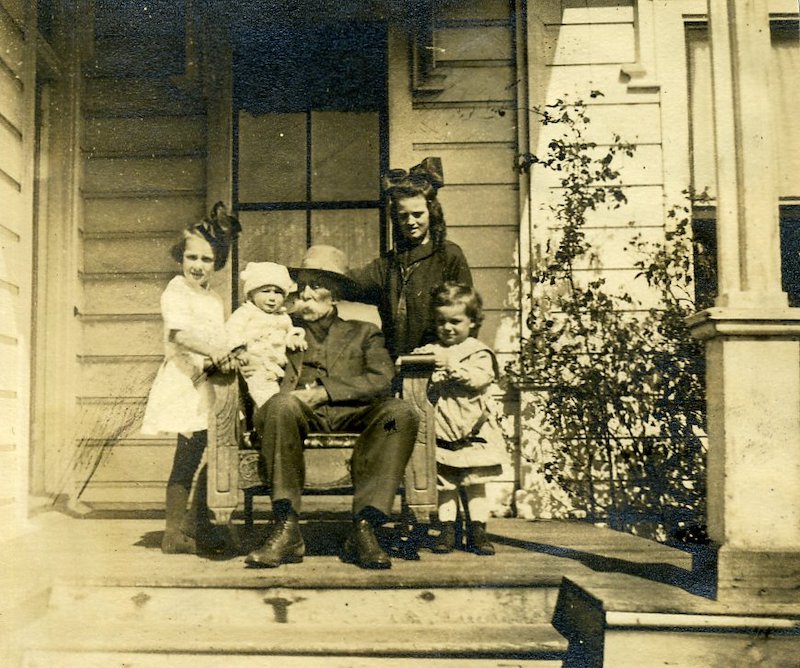Back in early May and June we discussed the histories of Mother’s and Father’s Days, respectively, and since we’re coming up on National Grandparents Day, it’s a good time to complete the trilogy. The newest, and least known, celebration of parental units, the observance was designated by Congress as the first Sunday in September after Labor Day, and it was proclaimed a national holiday by President Jimmy Carter in 1978.

C. O. Packard with his grandchildren, 1917. Left to right: Violet Clyma, Harold Salvador, C. O. Packard, Dorothy Kirkwood, and Buster Salvador. They are on the front porch of his home, located on the northeast corner of Little Lake and Kasten Streets. Mr. Packard was an early-day druggist and business man, who had a store in a now-gone building on Main Street, just two doors west of the Mendocino Hotel.
For something so recent, establishing the forces behind its origin is surprisingly complicated. Was it the pioneering work of Jacob Reingold who, during the 1961 White House Conference on Aging—the first one ever, hosted by President Eisenhower—was inspired by a speech about the “new image of the aged,” focusing on the millions of older Americans who are involved grandparents? He went back to his home in the Bronx and got Grandparents Day made an official borough holiday in 1963.
It probably didn’t start with the letter nine-year-old Russell Capper of Houston, Texas sent President Nixon in June of 1969, suggesting that a national day be set aside in order to celebrate grandparents. He received a letter back from Rose Mary Woods (you may remember her skill with a tape recorder), reading, “Dear Russell, Thank you for your letter to President Nixon. Your suggestion regarding a Grandparent’s Day is appreciated, but the President ordinarily issues proclamations designating periods for special observance only when a Congressional resolution authorizes him to do so. With best wishes, Sincerely, Rose Mary Woods, Personal Secretary to the President.”
Meanwhile, Marian McQuade, who served on the West Virginia Commission on Aging and Nursing Home Licensing Board, and who had for many years participated in the Past 80 Party held annually in Richwood, WV, was campaigning for a statewide observance. Like her sister West Virginian, Anna Jarvis, the founder of Mother’s Day, she was tenacious, and in 1973 West Virginia became the first state to proclaim a special day to honor grandparents. Cheered and emboldened by her success in the Mountain State, she took her campaign to Washington, DC. By this time she had borne and raised 15 children, and was well on her way to 43 grandchildren; no wonder she was committed to the cause.
Unlike Richard Nixon, Jimmy Carter did find the notion of National Grandparents Day compelling, perhaps because of his close relationship with his mother, Lillian Gordy Carter—“Miss Lillian” to everyone—mother of four, grandmother to 14, nurse, Peace Corps volunteer in India, and real live wire. She worked on many humanitarian pursuits well into her old age because, as she once said, “I’m the most liberal woman in the county [Sumter] and maybe the whole state [Georgia].” When she died at 85 in 1983, her son Jimmy remarked, “I don’t think anyone who met my mother ever forgot her.”
The official flower of National Grandparents Day is the forget-me-not, appropriate for a day dedicated to recognizing the important role grandparents play in providing love, wisdom, and strength to their families. And often childcare: around 25% of the grandparents in the U.S. care for their young grandchildren on a daily basis. Others just spoil the little ones when they get a chance. Whatever their role in our lives, they let us know where we come from, and who we are. If you are lucky enough to have grandparents in your life, on Sunday, September 10th, let them know you appreciate them.
The Kelley House Museum is open from 11AM to 3PM Thursday through Monday. If you have a question for the curator, please make an appointment with curator@kelleyhousemuseum.org Walking tours of the historic district depart from the Kelley House regularly.